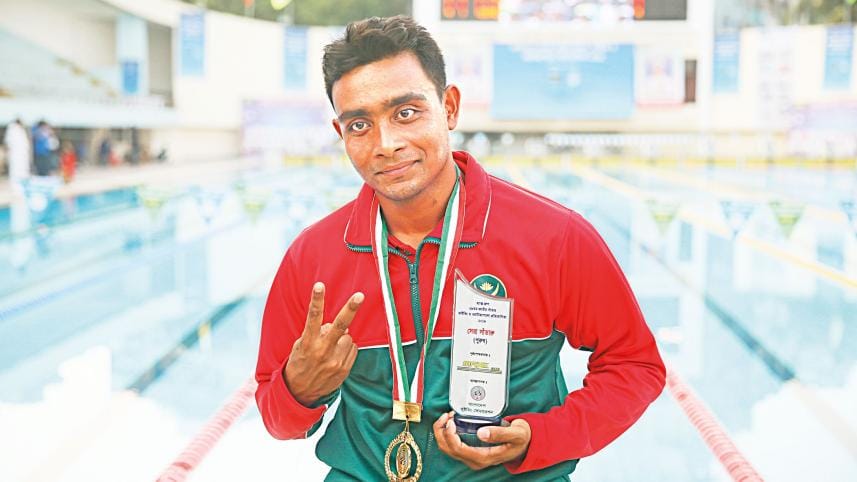‘Local swimmers train anywhere they find water bodies’

Amla, a small village in Kushtia, is renowned for giving the country some of its talented swimmers. Jewel Ahmed, a 35-time gold medalist swimmer at the national level, is one such athlete who also hails from this village. In an interview with The Daily Star's Ashfaq Ul Mushfiq, Jewel shared his experiences in Amla and talked about the things that need to be done to improve the scenario of his village.
The Daily Star (DS): Tell us about the early stages of your career.
Jewel Ahmed (JA): I started swimming back in 2003. Initially, I didn't know much about the rules of swimming. So, when I took part in my first competition, I just had this excitement of going to Dhaka. I went there with my coach, participated in the competition and came back home. But later when I realised there is an uproar around those who win medals, I said to myself that I have to win as well. So that's how my journey in swimming started and I won my first age-level (8 to 10 years) gold in 2008.
DS: What is the process of becoming a professional swimmer from places like Amla?
JA: Back in our days, there was a good tradition of swimming in Amla. We had two swimming clubs. Later on, Bangladesh Ansar also came to Amla and swimmers from different parts of the country gathered there and chose their preferred clubs for training. To get into the service teams, swimmers need to beat a standard time and only the ones who can do that get selected.
DS: How do the swimmers get into academies in Amla?
JA: Everyone comes here of their own will. My story was that when I got interested in swimming, I went to Amla and talked to the coaches and expressed my interest to be a swimmer. And when they saw my eagerness to learn and swim, they told me to come regularly.
DS: Were there any admission or monthly fees involved?
JA: No, to this day, no swimmers have had to pay a single penny to train in Amla. All the coaches there train swimmers voluntarily.
DS: How was the training routine for swimmers in Amla?
JA: We always trained according to the routine. Usually, in the morning, we trained from 6 to 8 or 9 and from 4 to 6 in the evening.
DS: Amla used to produce a lot of talented swimmers who would go on to win medals in international events. But it is said that things are not like how it used to be. What's your thought about this?
JA: The main asset for a swimmer is a swimming pool which is yet to be established in Amla. I used to train in the ponds of Amla Government Degree College. With the help of our coaches, we used bamboo sticks to somehow make walls for swimmers in the pond and continued training like that. We demanded for a swimming pool in Amla for a long time. But the problem was that only orders were given but no sign of implementation. If you have talented swimmers but don't have a swimming pool, things don't work like that.
I started swimming back in 2003. Initially, I didn't know much about the rules of swimming. So, when I took part in my first competition, I just had this excitement of going to Dhaka. I went there with my coach, participated in the competition and came back home. But later when I realised there is an uproar around those who win medals, I said to myself that I have to win as well.
DS: What do you think needs to be done to improve such a scenario?
JA: As I've said, a swimming pool is a must. And a proper club is needed which will not only maintain the swimming pool but conduct swimming activities. They should hire a coach who will select prospects and train them on a regular basis. In Amla, currently, there are two swimming teams but they don't have a single place to train as the swimmers have been forbidden to train in the ponds of Amla Degree College since 2016. So the local swimmers are now training anywhere they find water bodies. There is no measurement, nobody to check the time, and no proper facilities for swimming.
 For all latest news, follow The Daily Star's Google News channel.
For all latest news, follow The Daily Star's Google News channel.
Comments